Small and entry-level cars on sale in South Africa have been given another bloody nose in the latest round of crash tests in which Global NCAP’s new #SaferCarsForAfrica crash results revealed a disappointing two star occupant safety rating for the Kia Pegas and Renault Triber and only one star for the Maruti Suzuki Ertiga.
Global NCAP’s crash test protocols assess frontal and side impact protection for all models, as well as Electronic Stability Control (ESC). Pedestrian protection and side pole impact protection assessments are required for vehicles scoring the highest star ratings. More information on the protocol requirements can be found on the Global NCAP web site: hVps://www.globalncap.org/resources
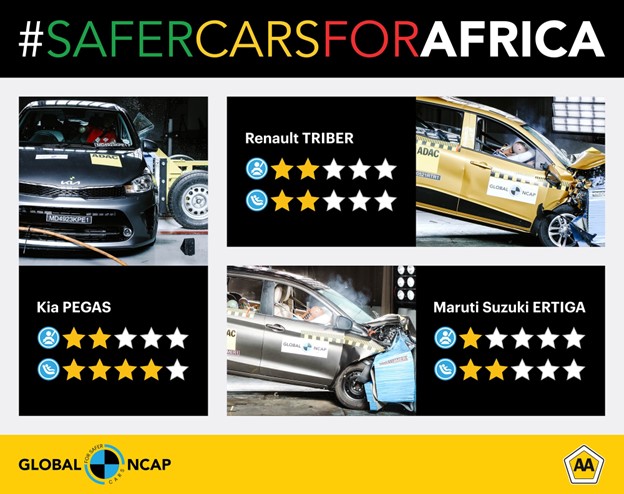
For the safest choice in buying a pre-owned car - click here
The #SaferCarsforAfrica initiative, in partnership with the Automobile Association of South Africa (AA), and funded by Bloomberg Philanthropies and the FIA Foundation, has brought to light concerning discrepancies in vehicle safety standards.
Alejandro Furas, Secretary General of Global NCAP, expressed frustration, stating: "It's disappointing to see renowned global brands such as Renault, Kia and Maruti Suzuki providing subpar safety performance in South Africa while ensuring higher safety standards in other markets. Shouldn't African consumers expect the same level of protection?"
Echoing this sentiment, David Ward, Executive President of the Towards Zero Foundation, emphasized the urgent need to eliminate the double standard in vehicle safety.
"Manufacturers are well aware of how to design safer vehicles for adults, children, and vulnerable road users. Addressing these disparities and promoting equitable vehicle safety in Africa remains a top priority for Global NCAP," he said.
Sikkie Kajee, Chairman of the Automobile Association, acknowledged the ongoing issues but remained hopeful.
"We are concerned about the low safety ratings from manufacturers, but we trust they will use these results to enhance their safety measures. The double standards in vehicles produced for Africa are troubling, yet we believe these issues are being addressed and anticipate fewer discrepancies in the future."
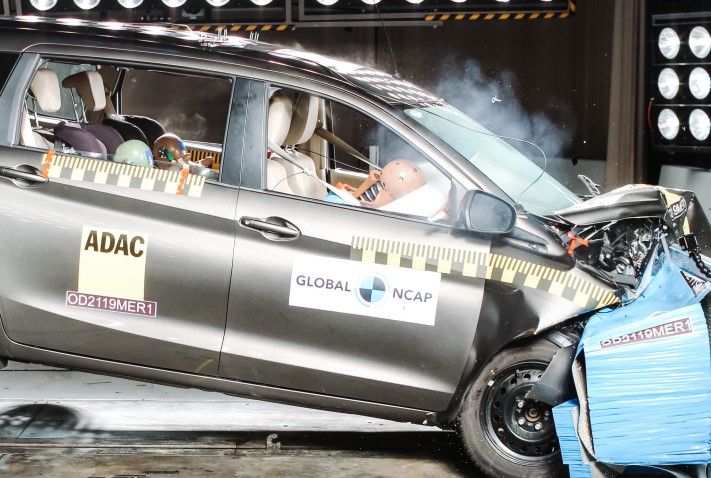
Looking to find out what you can afford - click here
Maruti Suzuki Ertiga: Safety Analysis
The Maruti Suzuki Ertiga, produced in India, comes standard with two frontal crash bags. Despite this, its structural integrity was deemed borderline unstable. The footwell area exhibited instability, with pedal displacement posing injury risks to the driver's lower legs.
While head and neck protection for adult occupants was satisfactory, chest protection varied, being good for the passenger but only marginal for the driver.
In side impact tests, the Ertiga showed good protection for the head, pelvis, and abdomen, though chest protection was only adequate. Notably, side crash bags are not offered, even as an option.
The passenger pretensioner malfunctioned and child occupant protection was poor for the 18-month-old dummy due to improper Child Restraint System (CRS) installation. The Ertiga’s rear center lap belt and inability to disconnect the passenger airbag when using a rearward-facing CRS contributed to significant safety concerns.
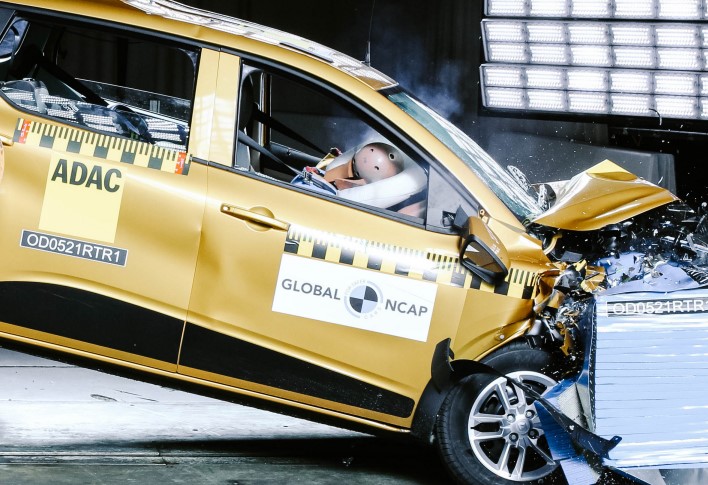
Make sure your are fully covered by insurance - click here
Renault Triber: Safety Performance
The Renault Triber, also manufactured in India, provided good protection for the driver’s and passenger’s head and neck, but chest protection for the driver was weak in both frontal and side impacts. The structural performance was unstable, with good protection for the head, abdomen, and pelvis in side impacts.
However, the lack of side crash bags and standard Electronic Stability Control (ESC) is a major drawback.
Child occupant protection in the Triber was inadequate due to the absence of ISOFIX anchorages and poor performance of the Q3 dummy, particularly in forward crashes. The vehicle also failed to provide three-point restraints in all seating positions and lacked a disconnection feature for the passenger airbag when using a rearward-facing CRS, resulting in a poor overall safety rating.
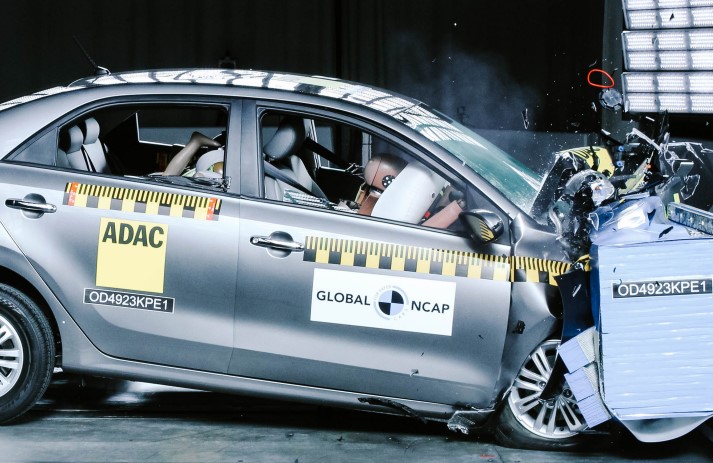
Kia Pegas: Safety Evaluation
The Kia Pegas, produced in China, comes standard with two frontal crash bags but was rated unstable in structure. Frontal impact tests revealed good head and neck protection for both occupants, though chest protection was marginal.
In side impact scenarios, the vehicle offered marginal chest protection, adequate head and abdomen protection and good pelvis protection. The lack of standard ESC and optional side crash bags is a notable shortfall.
The Pegas showed a strong performance in child occupant protection, earning a four-star rating. Both dummies were installed rearward-facing using ISOFIX anchorages and a support leg, providing full protection in frontal and side impact tests. However, the ISOFIX anchorages did not meet
Global NCAP’s labeling requirements, and the inability to disconnect the passenger crash bag when using a rearward-facing CRS in the front seat remains a concern.
The #SaferCarsforAfrica initiative continues to highlight the need for uniform vehicle safety standards across all markets, urging manufacturers to prioritize the safety of African consumers.
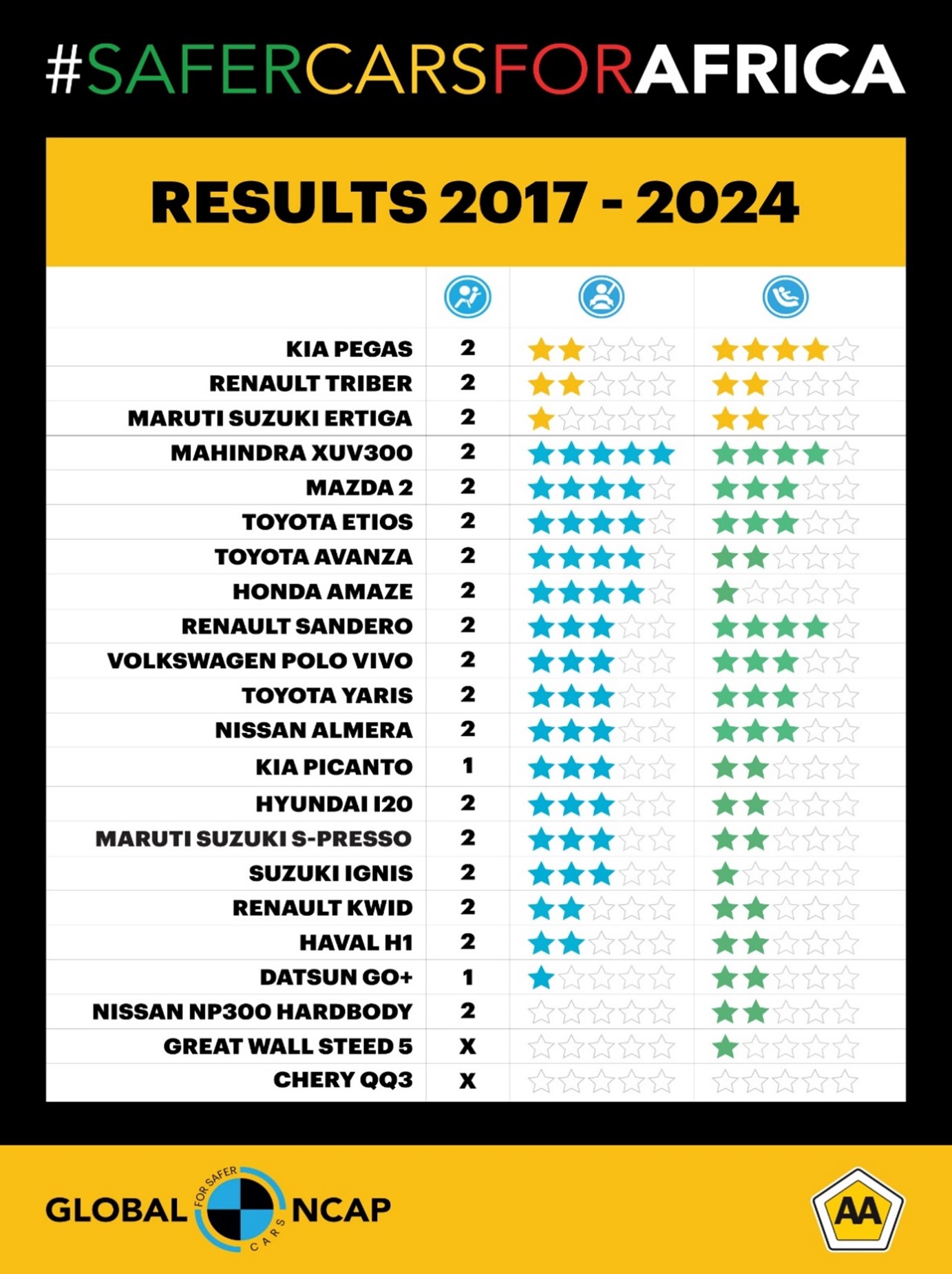 Colin Windell
Colin Windell
proudly CHANGECARS











